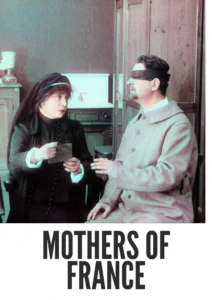Video Sources 0 Views

Synopsis
Rediscover a Wartime Masterpiece: Mothers of France (1916) Colorized

Step back in time and witness Sarah Bernhardt’s unforgettable performance in Mères Françaises, now beautifully colorized for a modern audience. This poignant film, set against the backdrop of World War I, tells the story of a French mother’s unwavering devotion to her country amidst personal tragedy. A powerful piece of cinematic history, this colorized version brings new life to a classic, offering a unique viewing experience for classic film enthusiasts and digital collectors alike.Movie StorylineSet during World War I, Mothers of France portrays the devastating impact of war on families. A devoted mother loses both her son and husband in the trenches. Driven by grief and unwavering patriotism, she dedicates her life to the French cause, assisting the wounded and offering solace to those affected by the conflict . The film captures her transformation into a symbol of resilience and national pride1.Movie Cast
- Sarah Bernhardt
- Berthe Jalabert
- Gabriel Signoret
- Jean Signoret
- Georges Melchior
- Jean Angelo
- Louise Lagrange
- Georges Deneubourg
Movie Genre
Drama, War, Silent Film, Propaganda6
Historical Context
Mothers of France was filmed during World War I, offering a rare glimpse into wartime France1. The movie showcases authentic location footage of trenches, munition depots and damaged areas, like the Rheims Cathedral, providing a historical backdrop to the story . The film reflects the French sentiment during the war, emphasizing patriotism and sacrifice . Released in 1916 (also referred to as 1917), it provides a snapshot of French society and the emotional climate of the time .
Colorization DetailsThis colorized version of Mothers of France has been carefully restored to enhance the viewing experience while preserving the film’s original integrity. The colorization process brings depth and vibrancy to the visuals, allowing modern audiences to connect with the story in a new way . Every effort has been made to ensure historical accuracy in the colorization, providing an authentic representation of the era5.
Technical Specifications
Experience Mothers of France in high definition, with enhanced visual clarity and detail. The colorization process has been meticulously applied to ensure a seamless and visually stunning presentation.
Technical Details
- Download format: MP4
- Resolution: HD (1080p)
- Compatibility: Compatible with all modern devices (smartphones, tablets, computers, and smart TVs)
Why Watch Mothers of France (1916) Colorized?
- A Piece of History: Witness a genuine portrayal of wartime France, featuring actual locations and genuine emotions .
- Sarah Bernhardt’s Performance: Experience the legendary actress in one of her most memorable film roles .
- Visually Stunning: The colorization enhances the film’s visual impact, creating a more immersive viewing experience .
- High-Quality Restoration: Enjoy the film in high definition, with enhanced clarity and detail.
Download Mothers of France (1916) Colorized today and own a piece of cinematic history! Experience this powerful film in stunning HD and discover a new appreciation for Sarah Bernhardt’s timeless performance . Don’t miss this opportunity to add a colorized classic to your digital collection.
Citations:
https://www.imdb.com/title/tt0008359/
https://en.wikipedia.org/wiki/Frantz_(film)
https://keywordseverywhere.com/blog/seo-strategy-the-definitive-guide-2025/
https://www.sundance.org/blogs/seo-lifeblood-of-the-indie-filmmaker/
https://www.cwgc.org/our-work/blog/the-true-story-behind-the-war-film-1917/
https://www.filmaffinity.com/en/film919779.html
https://aioseo.com/content-optimization/
https://www.adaminsights.com/cracking-the-keyword-code-in-2025-your-ultimate-seo-guide/
https://letterboxd.com/film/mothers-of-france/crew/
https://encyclopedia.1914-1918-online.net/article/filmcinema-france/
https://www.themoviedb.org/movie/273396-m-res-fran-aises
https://mabumbe.com/movies/titles/198276/mothers-of-france
https://trakt.tv/movies/mothers-of-france-1916
https://filmflow.tv/movie/273396-mothers-of-france
https://www.iwm.org.uk/collections/item/object/16662
https://www.imdb.com/title/tt0006350/
https://www.youtube.com/watch?v=diuohBI6gRk
https://moviessilently.com/2019/04/14/where-are-my-children-1916-a-silent-film-review/
https://alwanfilm.com/movies/mothers-of-france-colorized/
https://www.jstor.org/stable/40108084
https://www.loc.gov/item/2014564477
https://en.wikipedia.org/wiki/List_of_films_set_during_the_French_Revolution_and_French_Revolutionary_Wars
https://www.searchenginejournal.com/seo-strategic-insights-tactical-advice/383325/
https://www.adaminsights.com/8-outdated-seo-strategies-to-forget-by-the-end-of-2024-and-what-you-should-adopt-in-2025/
https://www.outranking.io/blog/the-ultimate-guide-to-seo-content-optimization-for-higher-rankings/
https://www.youtube.com/watch?v=c9lFtvd9qOQ
https://www.go-globe.com/seo-strategies-in-2025/
https://indexplease.com/blog/seo-techniques-for-faster-indexing
https://www.thehoth.com/learn/seo/on-page-seo/content-optimization/
https://uncoveringjewishheritage.com/category/genealogy/
https://www.reddit.com/r/youtube/comments/7dbiip/advice_on_youtube_keywords_from_a_youtuber_with/
https://portal.ehri-project.eu/keywords/ehri_terms-819?dlid=fra&page=7
https://www.businesscontent.com/the-art-and-science-of-keyword-clouds-in-seo-strategies/
https://www.khi.fi.it/pdf/publikationen/i-mandorli/Photo-Archives-and-the-Photographic-Memory.pdf
https://www.coteries.com/en/articles/seo-glossary-50-terms-to-know
https://www.alamy.com/stock-photo/1916-soldiers-two.html
https://www.tunepocket.com/youtube-channel-keywords-list/
https://portal.ehri-project.eu/keywords/ehri_terms-824?dlid=hun&page=3&sort=updated
https://www.imdb.com/search/title/?explore=keywords
https://www.overthefront.com/data_resources/Suddaby_Bombing_Bibliography_1960-2023.doc
https://www.toprankmarketing.com/blog/expert-seo-tips/
https://bronx.com/seo-trends-in-2025-what-you-need-to-know-to-stay-ahead/
https://firstpagesage.com/seo-blog/seo-best-practices/
https://backlinko.com/seo-strategy
https://www.academia.edu/75348257/La_M%C3%A8re_Moderne_Representations_of_Motherhood_in_French_Visual_Culture_1910_1940
https://raindance.org/seo-for-filmmakers-how-to-captivate-both-humans-and-algorithms/
https://read.dukeupress.edu/camera-obscura/article-abstract/38/3%20%28114%29/35/383734/What-s-Your-Color-Mood-Conditioning-the-Postwar?redirectedFrom=fulltext
https://www.theseolabs.com/keywords-lists/movie/
https://artlist.io/blog/youtube-tags-and-keywords/
https://collections.ushmm.org/search/catalog/irn1004087
https://www.digivate.com/blog/seo/seo-optimised-movie-titles/





